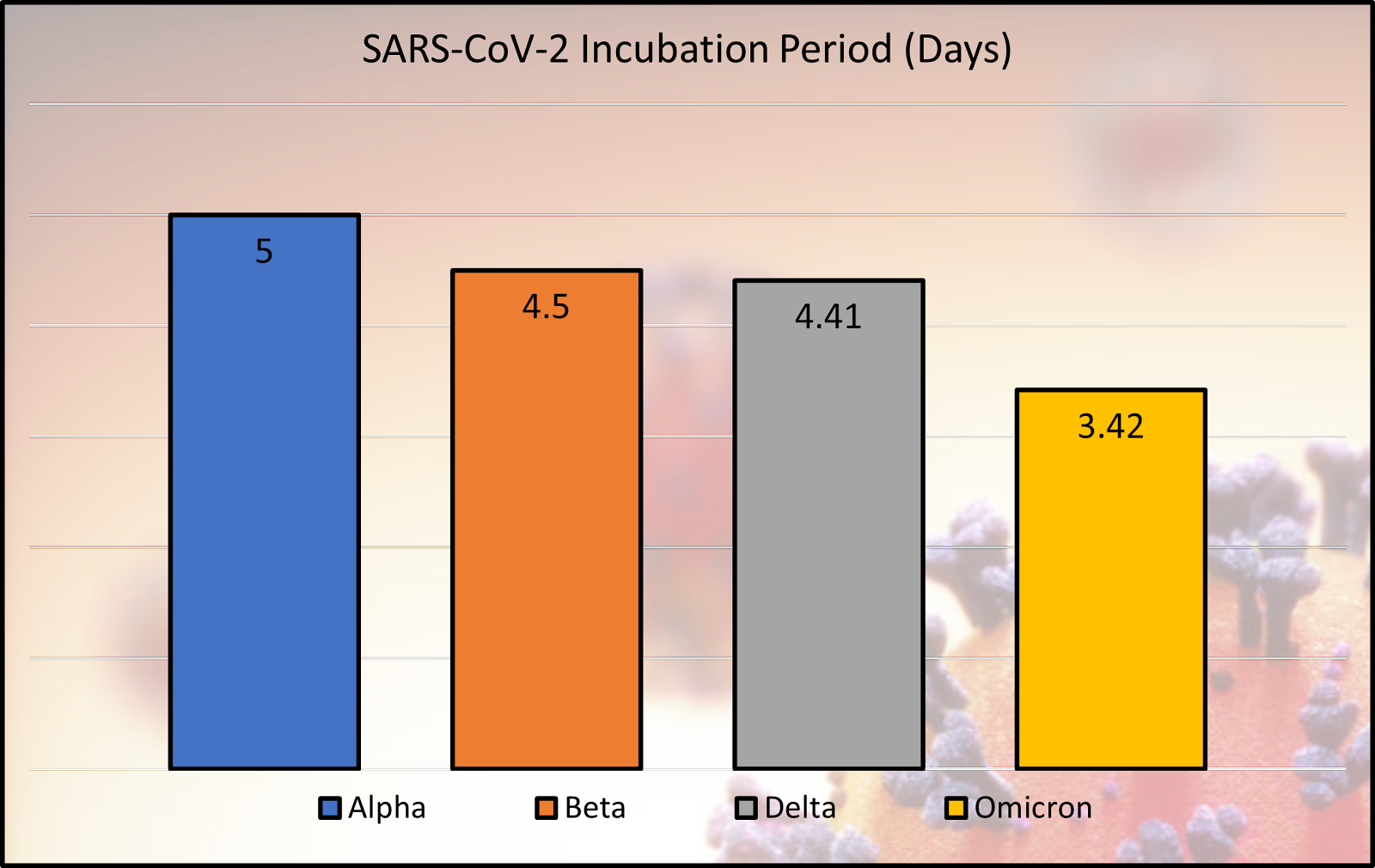A meta-analysis by scientists from the School of Public Health, Peking University, Beijing, China and Vanke School of Public Health, Tsinghua University, Beijing, China, has revealed just how sneaky Creationism's favourite pestilential designer has been with it variants of the SARS-CoV-2 virus - if you subscribe to that childish Bronze Age superstition, that is.
This meta-analysis of 141 relevant articles shows that, as well as becoming more virulent and more easily transmitted from person to person, the variant had a progressively shortening incubation period.
This might seem counter-intuitive because a slow incubation period means that a carrier remains asymptomatic for longer and so is more likely to spread the infection without realising they are infected. However, a short incubation period before it starts destroying cells in earnest also means the virus gets established more quickly and produces lots of new virus particles to be shed into the environment much sooner, and often before the victim's immune system has had time to react to it.
So, there is a trade-off between long incubation and asymptomatic spread and the short incubation and the number of virus particles being shed. It seems the balance tipped towards shorter incubation.
The analysis showed that "the incubation periods of COVID-19 caused by the Alpha, Beta, Delta, and Omicron variants were 5.00, 4.50, 4.41, and 3.42 days, respectively."
 Copyright: © 2022 The authors.
Copyright: © 2022 The authors.Published by American Medical Association Open Network.
Open access. (CC BY 4.0)
Key PointsCreationists must either ascribe this to the work of their beloved magic invisible designer or accept that there is something other than it that can direct the development over time of organisms of its making, that their supposedly omnipotent god is unable to control.
Question What are the incubation periods of COVID-19 caused by different SARS-CoV-2 strains?
Findings In this systematic review and meta-analysis of 141 articles, the pooled incubation period was 6.57 days. The incubation periods of COVID-19 caused by the Alpha, Beta, Delta, and Omicron variants were 5.00, 4.50, 4.41, and 3.42 days, respectively.
Meaning These results suggest that with the evolution of mutant strains, the incubation period of COVID-19 decreased gradually from Alpha variant to Omicron variant.
Abstract
Importance Several studies were conducted to estimate the average incubation period of COVID-19; however, the incubation period of COVID-19 caused by different SARS-CoV-2 variants is not well described.
Objective To systematically assess the incubation period of COVID-19 and the incubation periods of COVID-19 caused by different SARS-CoV-2 variants in published studies.
Data Sources PubMed, EMBASE, and ScienceDirect were searched between December 1, 2019, and February 10, 2022.
Study Selection Original studies of the incubation period of COVID-19, defined as the time from infection to the onset of signs and symptoms.
Data Extraction and Synthesis Following the Preferred Reporting Items for Systematic Reviews and Meta-analyses (PRISMA) reporting guideline, 3 reviewers independently extracted the data from the eligible studies in March 2022. The parameters, or sufficient information to facilitate calculation of those values, were derived from random-effects meta-analysis.
Main Outcomes and Measures The mean estimate of the incubation period and different SARS-CoV-2 strains.
Results A total of 142 studies with 8112 patients were included. The pooled incubation period was 6.57 days (95% CI, 6.26-6.88) and ranged from 1.80 to 18.87 days. The incubation period of COVID-19 caused by the Alpha, Beta, Delta, and Omicron variants were reported in 1 study (with 6374 patients), 1 study (10 patients), 6 studies (2368 patients) and 5 studies (829 patients), respectively. The mean incubation period of COVID-19 was 5.00 days (95% CI, 4.94-5.06 days) for cases caused by the Alpha variant, 4.50 days (95% CI, 1.83-7.17 days) for the Beta variant, 4.41 days (95% CI, 3.76-5.05 days) for the Delta variant, and 3.42 days (95% CI, 2.88-3.96 days) for the Omicron variant. The mean incubation was 7.43 days (95% CI, 5.75-9.11 days) among older patients (ie, aged over 60 years old), 8.82 days (95% CI, 8.19-9.45 days) among infected children (ages 18 years or younger), 6.99 days (95% CI, 6.07-7.92 days) among patients with nonsevere illness, and 6.69 days (95% CI, 4.53-8.85 days) among patients with severe illness.
Conclusions and Relevance The findings of this study suggest that SARS-CoV-2 has evolved and mutated continuously throughout the COVID-19 pandemic, producing variants with different enhanced transmission and virulence. Identifying the incubation period of different variants is a key factor in determining the isolation period.
Wu Y, Kang L, Guo Z, Liu J, Liu M, Liang W.
Incubation Period of COVID-19 Caused by Unique SARS-CoV-2 Strains: A Systematic Review and Meta-analysis.
JAMA Netw Open. 2022;5(8):e2228008. doi: 10.1001/jamanetworkopen.2022.28008
Copyright: © 2022 The authors.
Published by American Medical Association Open Network. Open access
Reprinted under a Creative Commons Attribution 4.0 International license (CC BY 4.0)
From the point of view of superstition-free, scientific evolution however, the virus would be expected to evolve in whatever direction makes more copies of it. Whether that's for (A) early transmission by asymptomatic victims, or a (B) short incubation period, more damage more quickly to the victim and lots more virus particle to be shed indiscriminately, will be a matter of the operation of natural selection. In this case, the outcome was for option B as the variants evolved from Alpha, through Beta and Delta, to the now predominant Omicron variant. It will be interesting to see in the new Omicron BA.2.75.2 sub-variant (actually a new take on the older Omicron BA.2 sub-variant rather than a newer version of the more recent Omicron BA.5 variant), has a shorter still incubation period.


No comments:
Post a Comment
Obscene, threatening or obnoxious messages, preaching, abuse and spam will be removed, as will anything by known Internet trolls and stalkers, by known sock-puppet accounts and anything not connected with the post,
A claim made without evidence can be dismissed without evidence. Remember: your opinion is not an established fact unless corroborated.